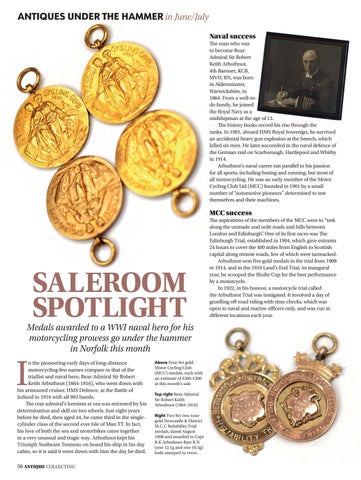ANTIQUES UNDER THE HAMMER in June/July Naval success The man who was to become RearAdmiral Sir Robert Keith Arbuthnot, 4th Baronet, KCB, MVO, RN, was born in Alderminster, Warwickshire, in 1864. From a well-todo family, he joined the Royal Navy as a midshipman at the age of 13. The history books record his rise through the ranks. In 1901, aboard HMS Royal Sovereign, he survived an accidental heavy gun explosion at the breech, which killed six men. He later succeeded in the naval defence of the German raid on Scarborough, Hartlepool and Whitby in 1914. Arbuthnot’s naval career ran parallel to his passion for all sports, including boxing and running, but most of all motorcycling. He was an early member of the Motor Cycling Club Ltd (MCC) founded in 1901 by a small number of “automotive pioneers” determined to test themselves and their machines.
MCC success
SALEROOM SPOTLIGHT
Medals awarded to a WWI naval hero for his motorcycling prowess go under the hammer in Norfolk this month
I
n the pioneering early days of long-distance motorcycling few names compare to that of the triallist and naval hero, Rear-Admiral Sir Robert Keith Arbuthnot (1864-1916), who went down with his armoured cruiser, HMS Defence, at the Battle of Jutland in 1916 with all 903 hands. The rear admiral’s heroism at sea was mirrored by his determination and skill on two wheels. Just eight years before he died, then aged 44, he came third in the singlecylinder class of the second ever Isle of Man TT. In fact, his love of both the sea and motorbikes came together in a very unusual and tragic way. Arbuthnot kept his Triumph Sunbeam Tonneau on board his ship in his day cabin, so it is said it went down with him the day he died.
56 ANTIQUE COLLECTING
Above Four 9ct gold
Motor Cycling Club (MCC) medals, each with an estimate of £200-£300 at this month’s sale Top right Rear-Admiral Sir Robert Keith Arbuthnot (1864-1916) Right Two 9ct two-tone
gold Newcastle & District M.C.C Reliability Trial medals, dated August 1908 and awarded to Capt R.K Arbuthnot-Bart R.N (one 12.1g and one 10.5g) both stamped to verso.
The aspirations of the members of the MCC were to “trek along the unmade and unlit roads and hills between London and Edinburgh”. One of its first races was The Edinburgh Trial, established in 1904, which gave entrants 24 hours to cover the 400 miles from English to Scottish capital along remote roads, few of which were tarmacked. Arbuthnot won five gold medals in the trial from 1908 to 1914, and in the 1910 Land’s End Trial, its inaugural year, he scooped the Shulte Cup for the best performance by a motorcycle. In 1922, in his honour, a motorcycle trial called the Arbuthnot Trial was instigated. It involved a day of gruelling off-road riding with time checks, which was open to naval and marine officers only, and was run in different locations each year.
